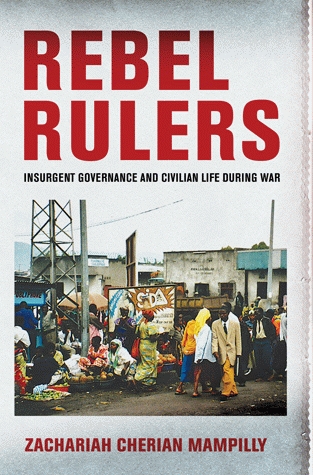 Author: Zacharian Cherian Mampilly
Author: Zacharian Cherian Mampilly
Publisher: Cornell University Press – 293 pages
Book Review by: Paiso Jamakar
There are probably no books out there on how rebels rule territories they capture. This book does not only take a look on how they rule, it does so intensively. It is based on research, including eyewitness on-site observations by the author, Professor Zachariah Cherian Mampilly, on how three rebel organizations have ruled areas they brought into their control.
The research material for this book was also gathered by him through numerous interviews. He interviewed rebel leaders, both during and after conflicts, in the period between 2004 and 2011. He also spoke with others closest to governance issues at the local level, as well as listened to “everyday voices.” A large list of the many people he interviewed for this study is provided in six pages in the Appendix.
The three groups whose activities he studied are: the Liberation Tigers of Tamil Eelam (LTTE) in Sri Lanka, the Rally for Congolese Democracy (RCD) in Congo, and the Sudan People’s Liberation Movement/Army (SPLM/A) in Sudan,
He found out that rebel rulers put in place effective systems for governing (and providing services to) the people in the territories they capture.
The common impression people have of rebels is that they’re oppressive exploiters and thieves, and have no ability to govern. But Mampilly shows in this eye-opening book that they are capable of setting up, and have set up, systems of government, which can deliver, and have delivered a variety of public services to people living in the captured lands.
In this book of surprises, the author shows that rebels have been able to successfully establish and maintain some of the instruments and agencies of governance that we find in legitimate governments, such as courts, hospitals, police stations, schools, and even systems of taxation to pay for these services.
The rebel “governments” have also been able to create anthems and flags as symbols of their authority in the areas of their control. Surprisingly, they have been able to get compliance to their rules from people within their controlled territories. However, because they have not been elected or chosen by the people to govern them, they have been condemned and criticized internationally.
And of course, they’ve been constant targets of governments ruling the countries where these rebel groups carry on resistance activities.
Mampilly points out that rebels are aware of the needs of local people who challenge them in spite of having order and lack of chaos in the areas they reside. The rebels also face challenges from competing groups who threaten to take control of the territories they have already captured. He shows us that contrary to popular thought, rebel groups and their leaders can and do render benefits to people, but for the most part, they are viewed in a negative light.
Specific details of his studies of the activities of the three rebel organizations we mention above are laid out in the author’s Introduction and other chapters of his book. To give you an overview for you to choose which ones to read first, they are:
- Introduction: Governing Rebels
- Bandits, Warlords, Embryonic States, Black Spots, and Ungoverned Territories: The Unwieldy Taxonomy of Rebel-Governed Areas
- Understanding Variation in Insurgent Governance Systems
- The Two Faces of the Tiger: Sri Lanka’s Liberation Tigers of Tamil Eelam
- Building a New Sudan: The Sudan People’s Liberation Movement / Army
- 6. Resurrecting Bula Matari: The Rassemblement Congolais pour la Democratic-Goma
- Comparative Insurgent Governance
- Rules and Resistance: New Agendas for Studying Insurgency and Governance
Professor Mampilly provides some 15 pages of references that he consulted and the reader can go to, to look deeper into the various aspects of the subject covered in this insightful study of rebels.
In view of the positive aspects of rebel rule that this book reveals, it is unique and forges new paths for the public. We commend Mampilly’s pioneering effort in writing it, New views of rebels not seen before have been opened up with it.
Zachariah Cherian Mampilly is Assistant Professor in the Departments of Political Science, International Studies, and Africana Studies at Vassar College.







